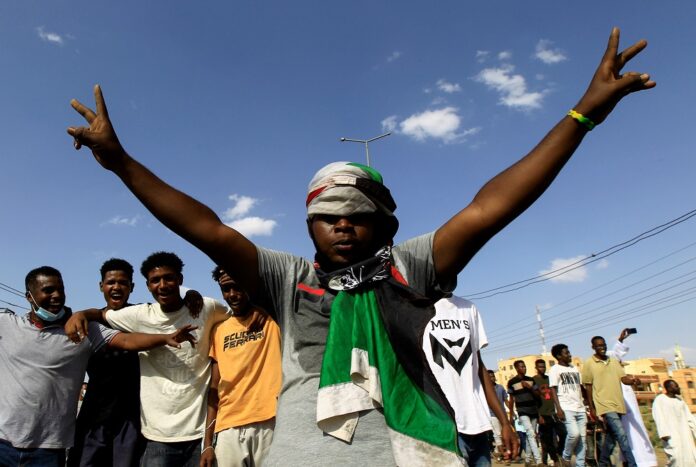A protester gestures as people demonstrate against the Sudanese military’s recent seizure of power and ousting of the civilian government, in the capital Khartoum, Sudan October 30, 2021. — Reuters pic
KHARTOUM, Nov 1 — A UN official discussed mediation options and possible “way forward” for Sudan with its ousted prime minister yesterday, a day after hundreds of thousands of protesters took to the streets to demand an end to military rule.
The outpouring of dissent posed the biggest challenge to General Abdel Fattah al-Burhan since he toppled Prime Minister Abdalla Hamdok’s cabinet last Monday and arrested key politicians. The streets were largely calm yesterday.
Late yesterday, judicial sources confirmed the release of Ibrahim Ghandour, head of the disbanded former ruling party, and other former Islamist officials.
“I will continue these efforts with other Sudanese stakeholders,” Volker Perthes, the UN Special Representative for Sudan, said in a Twitter post.
Perthes said Hamdok was “at his residence where he remains well but under house arrest”.
Mediation efforts by the international community and within Sudan had been announced before Saturday’s protests, with no outcome reported.
The main compromise under discussion, say politicians who have presented it, is a proposal for Hamdok to be given full executive powers and appoint a cabinet of technocrats.
The proposal, which the sources say has been presented to all sides, would do away with the 14-member power-sharing Sovereign Council in favour of a three-person honorary council.
Political parties, rebel groups, and the military, partners in the pre-coup government, would be represented in parliament, and the military would continue to lead a Security and Defence Council, they said.
Hamdok has demanded the release of detainees and a return to the pre-coup power-sharing arrangement before negotiating further, sources close to him said last week.
The coup took place 2-1/2 years after a popular uprising ousted the authoritarian Omar al-Bashir, who had ruled Sudan, Africa’s third largest country, for three decades.
The Central Committee of Sudanese Doctors said three protesters were shot dead by security forces in Khartoum’s twin city of Omdurman on Saturday. Sudanese police denied shooting protesters during the demonstrations, saying on state TV that one policeman sustained a gunshot wound.
With Saturday’s deaths, at least 15 protesters have been killed in clashes with security forces this week, a health ministry official said. Some 245 people were injured on Saturday, the official said.
Life returned to a near standstill in the capital Khartoum yesterday. Residents said strikes and security measures were causing paralysis.
Banks and most markets were closed, with only a few small stores and stalls open.
“You can’t do anything — everything is shut down. We need to work every day to make money,” said a fruit and vegetable seller in the city centre.
People were unable to cross into Khartoum from Omdurman and the capital’s other twin city, Khartoum North, because security forces had closed the Nile river bridges.
Unions of doctors, bankers, teachers and other groups have been on strike since last week and have said they will continue until demands are met, while resistance committees have barricaded neighbourhoods and created schedules of protests and civil disobedience.
Demands range from a handover of power to civilians in full to criminal charges against coup leaders.
The Sudanese Lawyers Union condemned the arrests of activists and political leaders. The union “warns that the Sudanese people are in front of an oppressive military movement paving the way for dark totalitarianism”.
Lawyers told Reuters they have petitioned to get access to detained officials and politicians.
Judiciary sources confirmed the release of Bashir’s former foreign minister Ghandour, as well as former security officials Mohamed Hamed Tabidi and Alshazali Almadih.
All three men had been detained under orders of a taskforce aiming to dismantle and prevent the return of the Bashir government, which the military has been critical of.
Other Bashir allies, former health minister Mamoun Humeida and businessman Abdalbasit Hamza, have also been released recently, judiciary sources said. — Reuters


